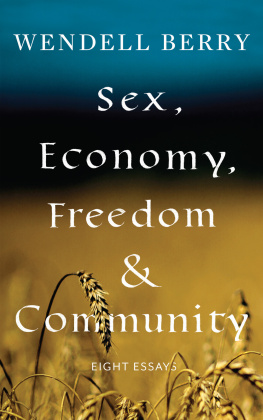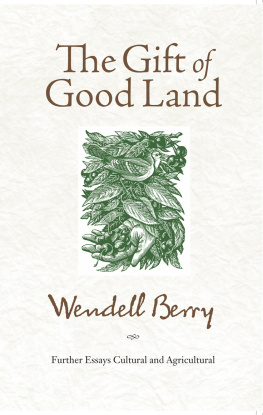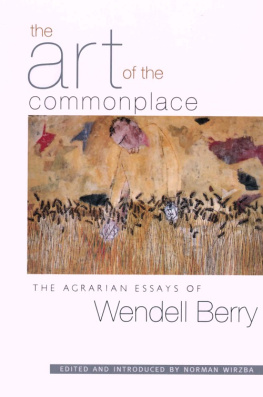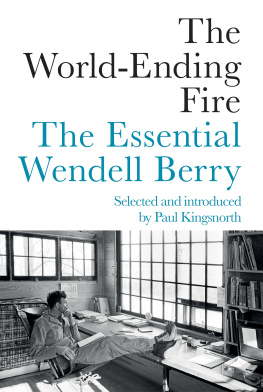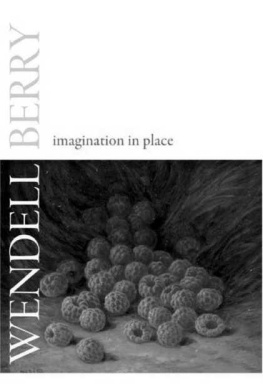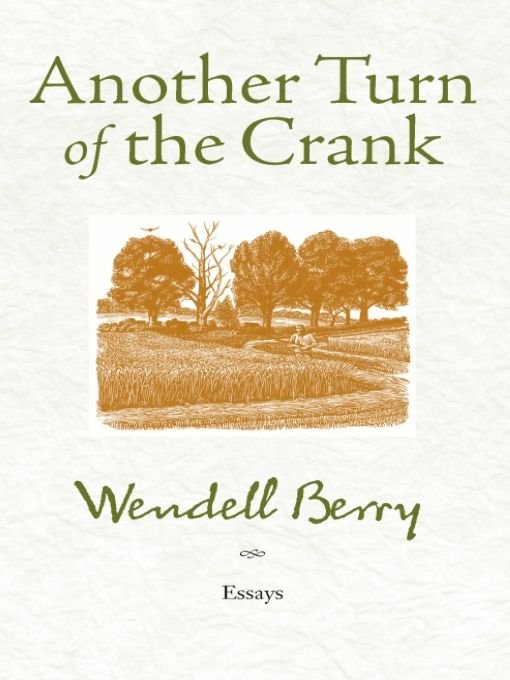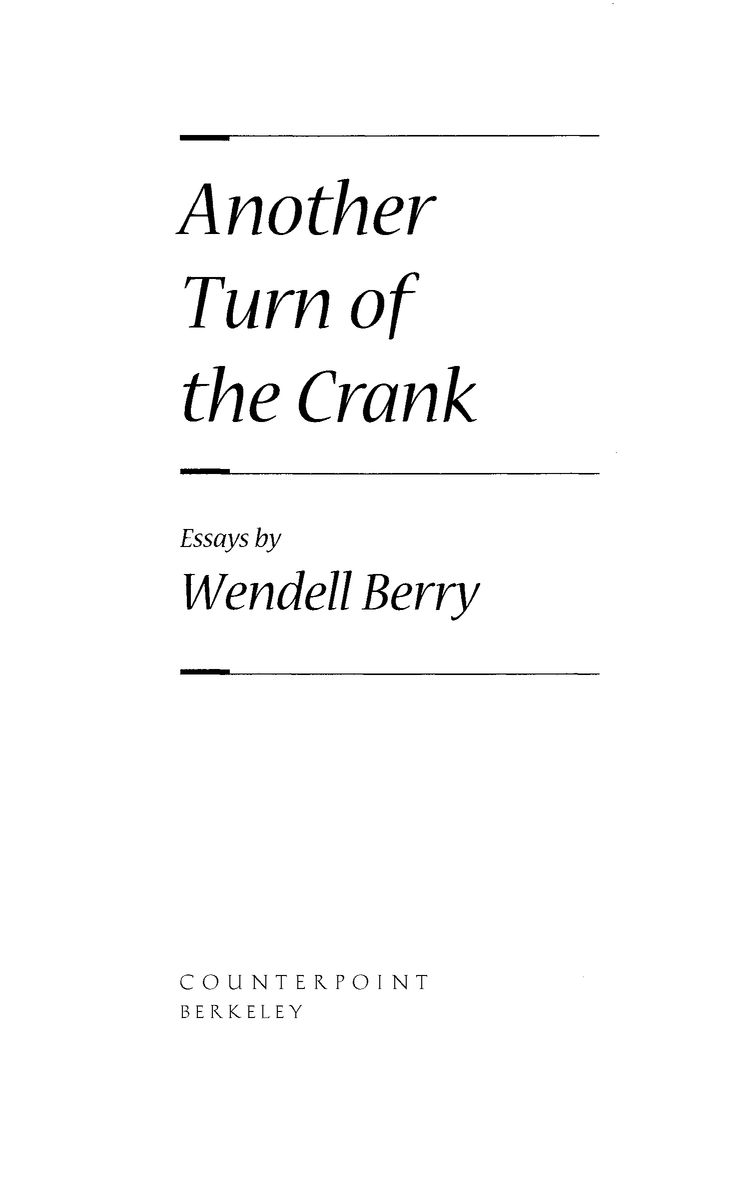Table of Contents
ALSO BY WENDELL BERRY
Fiction
The Discovery of Kentucky
Fidelity
The Memory of Old Jack
Nathan Coulter
A Place on Earth
Remembering
Watch with Me
The Wild Birds
Poetry
The Broken Ground
Clearing
Collected Poems: 19571981
The Country of Marriage
Entries
Farming: A Hand Book
Findings
Openings
A Part
Sabbaths
Sayings and Doings
Traveling at Home
The Wheel
Essays
A Continuous Harmony
The Gift of Good Land
Harlan Hubbard: Life and Work
The Hidden Wound
Home Economics
Recollected Essays: 19651980
Sex, Economy, Freedom & Community
Standing by Words
The Unforeseen Wilderness
The Unsettling of America
What Are People For?
For we are left but a few of many.
JEREMIAH 42:2
What to do? Stay green
Never mind the machine,
Whose fuel is human souls.
Live large, man, and dream small.
R. S. THOMAS
Foreword
THE ESSAYS in this book deal with a number of important issues that have now become obscured by poor politics, and they deal with other issues, equally important, that are now little noticed, and are perhaps not noticeable, by politicians; the book is therefore vulnerable to some misconceptions that I would like to correct beforehand.
Nothing that I have written here should be construed as an endorsement of either of our political parties as they presently function. Republicans who read this book should beware either of approving it as conservative or of dismissing it as liberal. Democrats should beware of the opposite errors.
One reason for this is that I am an agrarian: I think that good farming is a high and difficult art, that it is indispensable, and that it cannot be accomplished except under certain conditions. Manifestly, good farming cannot be fostered or maintained under the rule of the presently dominant economic and cultural assumptions of our political parties.
Another reason is that I am a member, by choice, of a local community. I believe that healthy communities are indispensable, and I know that our communities are disintegrating under the influence of economic assumptions that are accepted without question by both our partiesdespite their lip service to various noneconomic values.
The conservatives believe that an economy that favors its richest and most powerful participants will yet somehow serve the best interest of everybody. The liberals believe just as irrationally that a merely competitive economy, growing always larger in scale and controlled by fewer and fewer people, can be corrected by extending government charity to the inevitable victims: the dispossessed, the unrepresented, and the unemployed. No agrarian or community member could look kindly upon or wish to serve either belief.
A reader would also be in error who concluded, from this books reiterated wish to restore local life by means of local economies, that it is antigovernment. On the contrary, one of the fundamental purposes of these essays is to serve the cause of democratic government as established by the Constitution. I do not believe, however, that a nation can secure such a government merely by means of a constitution. Political democracy can endure only as the guardian of economic democracy, as I am by no means the first to say. A democratic government fails in failing to protect the integrity of ordinary lives and local communities. By now it should be pretty obvious that central planning is of a piece with absentee ownership and does not work. But to say as much is not to say that there is no proper role for government. The proper role of a government is to protect its citizens and its communities against conquestagainst economic conquest just as much as conquest by overt violence.
Underlying all that I have written here is the assumption that a people who are entirely lacking in economic self-determination, either personal or local, and who are therefore entirely passive in dealing with the suppliers of all their goods and services, including political goods and services, cannot be governed democraticallyor not for long. This seems to be borne out by the present decline of political dialogue into a rhetoric of increasingly violent abstraction, without compassion, imagination, manners, or goodwill. The voter is no longer understood as an intelligent citizen to be persuaded, but rather as a benighted consumer requiring only to be distracted or deceived.
Furthermore, I am convinced that the present concentration of the best educated and most able people in centers of power, industry, and culture is a serious mistake. I believe that for many reasonspolitical, ecological, and economicthe best intelligence and talent should be at work and at home everywhere in the country. And therefore, my wishes for our schools are opposite to those of the present-day political parties and the present-day politics of education and culture. Wes Jackson has argued that our schoolsto balance or replace their present single major in upward mobilityshould offer a major in homecoming. I agree.
Finally, it would be an error to think that, because the arguments set forth in this book are not at present spoken or heard by any prominent politician, they are the work of a person thinking and writing in isolation. In fact, these essays belong to a conversation that is current, vigorous, and growing. There are now hundreds of organizations actively at work all over our country on behalf of local health, conservation, and economy. The members of these organizations have been my teachers, they have given me hope, and I dedicate this book to them.
Acknowledgments
FOR HELP WITH these essays I am grateful to Tanya Berry, John M. Berry, Jr., Pam Clay, William H. Martin, Paula Huff, Marshall Pecore, Andy Cowart, Bill Herrick, Gurney Norman, Maurice Telleen, Wes Jackson, Brian Donahue, John Daniel, Jim Thomas, Philip Sherrard, Gary Anderson, Gene Logsdon, John Davis, Jack Shoemaker, and Nancy Palmer Jones.
Farming and the Global Economy
WE HAVE BEEN repeatedly warned that we cannot know where we wish to go if we do not know where we have been. And so let us start by remembering a little history.
As late as World War II, our farms were predominantly solar powered. That is, the work was accomplished principally by human beings and horses and mules. These creatures were empowered by solar energy, which was collected, for the most part, on the farms where they worked and so was pretty cheaply available to the farmer.
However, American farms had not become as selfsufficient in fertility as they should have beenor many of them had not. They were still drawing, without sufficient repayment, against an account of natural fertility accumulated over thousands of years beneath the native forest trees and prairie grasses.
The agriculture we had at the time of World War II was nevertheless often pretty good, and it was promising. In many parts of our country we had begun to have established agricultural communities, each with its own local knowledge, memory, and tradition. Some of our farming practices had become well adapted to local conditions. The best traditional practices of the Midwest, for example, are still used by the Amish with considerable success in terms of both economy and ecology.


